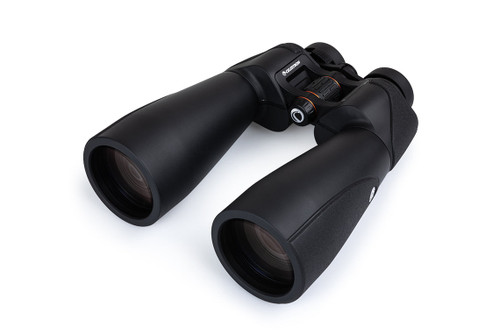Product Overview
- Celestron’s legendary SkyMaster binoculars get an upgrade with ED objective lenses for superior images virtually free of chromatic aberration with lifelike color, increased resolution, and improved contrast
- Large, 70mm objective lenses offer excellent light-gathering ability—perfect for astronomy
- Threaded eyepieces accept all standard 1.25” astronomical eyepiece filters to bring out details or reduce the effects of light pollution
- BaK-4 prisms and fully multi-coated optics with XLT coatings boost light transmission through the optical path for brighter, more detailed images
- The widely spaced objective lenses of the Porro prism optical design provide an enhanced 3-D view
- Eyeglass-friendly with generous eye relief and padded twist-up eyecups
- Durable rubber-armored housing with improved ergonomics for comfortable use in the field
- Tripod-adaptable for extended viewing sessions
Celestron SkyMaster Pro ED binoculars are the ideal choice for amateur astronomers or anyone who observes at great distances. The SkyMaster Pro ED uses superior optics, coatings, internal parts, and housing materials. With large objective lenses, BaK-4 prisms, ED glass, and fully multi-coated optics utilizing Celestron’s proprietary XLT coating technology, the view through a SkyMaster Pro ED sets the standard for astronomy binoculars.
ED Objective Lenses:
Extra-Low Dispersion (ED) glass virtually eliminates chromatic aberration, also known as color fringing, a visual phenomenon common in magnified optical systems. SkyMaster Pro ED delivers edge-to-edge sharpness with excellent color correction and razor-sharp images.
Not all ED glass is created equal. Celestron’s high-quality ED glass delivers brighter, sharper images than non-ED binoculars. The difference is especially apparent in low-light conditions.

Coatings and Prisms:
All of Celestron SkyMaster Pro ED’s lens surfaces are fully multi-coated and feature Celestron’s proprietary XLT optical coating technology. These powerful coatings, similar to the ones you’ll find on our observatory-grade telescopes, decrease reflectivity for higher optical throughput across a broad range of the visible light spectrum. What’s more, the prisms inside the binocular are made of high-quality BaK-4 glass, further boosting light transmission. Working together, the fully multi-coated lenses and BaK-4 prisms deliver more light from your target to your eye for brighter, more detailed views.
Objective Lenses:
The 70mm objective lenses offer plenty of light-gathering ability for superior low-light performance. The objective diameter-to-magnification ratio is ideal for scanning the skies, observing the Moon and planets, and exploring all the best deep-sky objects. Celestron SkyMaster Pro ED also makes an excellent choice for long-distance land-based viewing—especially at dawn or dusk.
The Body:
Custom-designed rubber armor and a durable chassis protect your SkyMaster Pro ED binocular from damage without weighing you down. Viewing through SkyMaster Pro ED binoculars is comfortable for eyeglass and non-eyeglass wearers alike, thanks to the retractable eyecups and nearly 16mm of eye relief. Eyeglass wearers can see the entire field of view while looking through the eyepiece with their glasses by twisting the eyecups down. For those who do not wear eyeglasses, the eyecups position the user’s eye behind the eyepieces at the correct distance for optimal viewing.
Ways to Observe:
The Celestron SkyMaster Pro ED binocular is tripod-adaptable. You can use a binocular tripod adapter (not included) to mount it on any standard photographic tripod or monopod for extended viewing or digiscoping (photography through the eyepiece).
SkyMaster Pro ED’s eyepieces are threaded to accept standard 1.25” astronomical eyepiece filters. Adding the right filter can deliver game-changing views for terrestrial and celestial observing. For terrestrial observation, filters can reduce the brightness of sand, snow, and water. For nighttime viewing, filters can cut glare, minimize eye strain, increase contrast, and even combat the effects of light pollution. Remember, the binocular needs a set of two filters. For a complete list of filters and their benefits.
| GENERAL | |
|---|---|
| Magnification: | 15x |
| Objective Lens Diameter: | 70mm (2.75") |
| Focal Length of Objective Lens: | TBD |
| Angular Field of View: | 4.4° |
| Linear Field of View (@1000 yds) / @1000 m): | 230 ft (77 m) |
| Exit Pupil: | 4.4mm (.17") |
| Eye Relief: | 15.7mm (.62") |
| Close Focus: | 42.7 ft (13 m) |
| Interpupillary Distance (max): | 72mm (2.83") |
| Interpupillary Distance (min): | 56mm (2.20") |
| Diopter Adjustment Range: | ±3 |
| Twilight Factor | 32.4 |
| Relative Brightness: | 21.78 |
| Limiting Stellar Magnitude: | Ideal: 11.73 | Moderate: 10.73 | Poor: 9.73 |
| Lens Coatings: | Fully Multi-Coated - XLT Coatings |
| Prism Glass (Type): | BaK-4 |
| Prism Coatings: | N/A |
| Weight: | 73.7 oz (2,089g) |
| Environmental Protection: | Waterproof (IPX7) |
| Nitrogen Filled: | Yes |
| Tripod Adaptable: | Yes |
| Carrying Case: | Deluxe Nylon |
| Dimensions: | 258mm x 220mm x 85mm (10.2" x 8.7" x 3.4") |
| Included Items: | Binoculars Objective lens caps Eyepiece Covers Rainguard Neck strap Lens cloth Non-Silica Dessicant Case Instruction manual |
| Solar Warning |
|




















